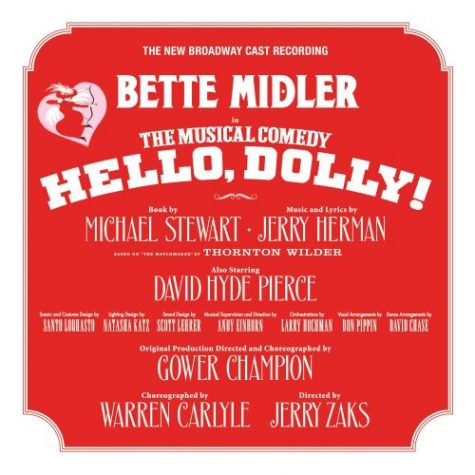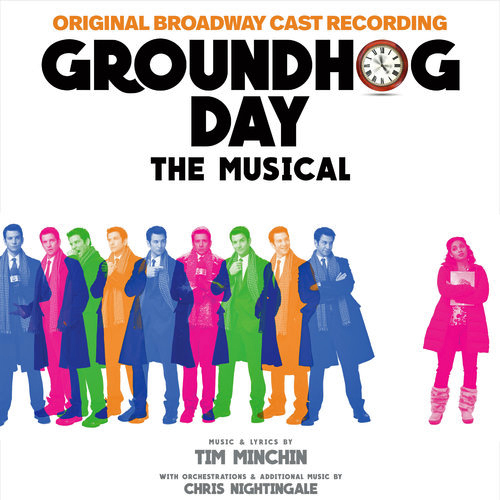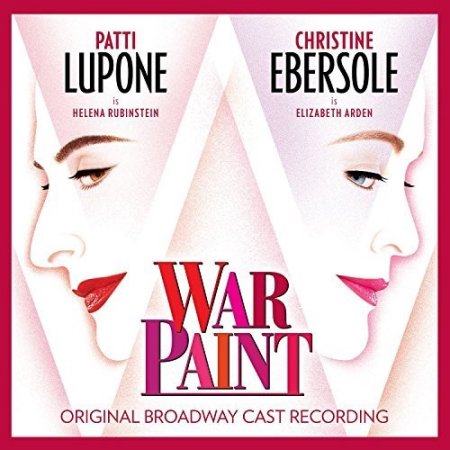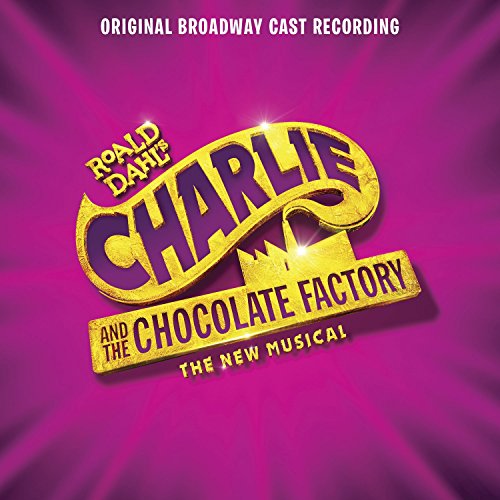
New Records is our column that considers recordings of shows and concerts. It’s a companion to the reviews that regularly appear here.
This time we take a look at albums from more shows from Broadway’s 2016-17 season, Hello Dolly!, Groundhog Day, War Paint, Charlie and the Chocolate Factory..
Hello, Dolly! (Masterworks Broadway)
This production has been a sold-out hit that, nevertheless, has been greeted skeptically by some afficionados. Bette Midler is a crowd-pleasing artist, and her persona seems a perfect fit for the role of the enterprising matchmaker, Dolly Levi. Yet there are those who say her voice isn’t large enough.
The size of her instrument scarcely matters when every stage performer is miked. And certainly on a recording it’s not a factor at all. Midler gives us an intimate Dolly, and on this Masterworks CD she is engaging. It’s true that she lacks belt, but let’s keep in mind that Carol Channing didn’t win fans by belting either; she projected humor and charm, and Midler succeeds in those departments. (Channing’s well-known Broadway successors, such as Pearl Bailey, Betty Grable and Phyllis Diller, made their mark with smallish voices. Only Ethel Merman gave us a strongly-projected Dolly.)
When Midler sings “I Put My Hand In,” she confides in us almost as if we’re together in her living room. She sounds adorable. She adds some nicely personal inflections and idiosyncratic grace notes. In the cast that surrounds her are two outstanding voices, reminding us of the beauties in Jerry Herman’s score.
Kate Baldwin is lovely as Irene Molloy, the young widow who falls in love with Cornelius. Known for her beautiful singing as Sharon in Finian’s Rainbow and Amalia in She Loves Me, Baldwin dazzles in this smaller role. Eileen Brennan displayed a nice voice in the 1964 original cast recording but sounded far too mature to be a believable match for the awkward young man who’s a clerk in Vandergelder’s dry-goods store. Baldwin, on the other hand, is a romantic dream when she sings the ballad, “Ribbons Down My Back.”
Gavin Creel, as Cornelius, also has an alluring voice. His high notes during “It Only Takes a Moment” are thrilling, which is more than anyone could claim for the originator of the role, Charles Nelson Reilly. Creel contributes strongly to “Put On Your Sunday Clothes,”“Dancing,” and “Elegance.” Reilly, however, made you smile every time he opened his voice, which quivered with vibrato. He, along with Channing, played everything for laughs.
Another asset of the new recording is the 26-piece orchestra, much larger than what we see in modern musicals, conducted by Jay Einhorn. The brass, reeds and strings carry us back to the type of sound we associate with Broadway’s golden age. They almost, but not quite, equal the punch of the band in the 1964 recording.
David Hyde Pierce as Horace Vandergelder is a disappointment. He doesn’t sing as well as he did on the Spamalot and Curtains albums, and fails to create an impression with his vocal acting. He has been given the privilege, in this production, of singing one song cut before the show’s opening in 1964, “Penny in my Pocket.” It’s a cute little song, not one of Jerry Herman’s masterpieces.
An additional pleasure in this new release is the comprehensive essay on Hello, Dolly! written by the knowledgeable and expressively literate Steven Suskin. The cover of the packaging is intentionally copied from the 1964 original.
The new recording is essential because it presents longer versions of some of the songs. “Put On Your Sunday Clothes” lasts more than five minutes compared to 4:16 on the old record; the charming “Dancing” waltzes in at 6:52 instead of 4:27; “Before the Parade Passes By” is 4:32 instead of 3:18; and the scene in the Harmonia Garden (which includes the title song) is 9:30 instead of 5:41.
In addition, we get that restored song for Vandergelder, plus up-to-date sound. Good as it is, this can not displace the memorable interpretations nor the hilarity of the original. Both of them belong in your record collection. The currently-available version of the 1964 recording, also on the Masterworks label, has bonus tracks of Mary Martin in the show’s 1965 London production, Pearl Bailey from the all-black 1967 Broadway version, and two songs by Ethel Merman. The RCA recording of a 1994 revival, with Channing and Jay Garner, can be ignored.

Groundhog Day (Masterworks Broadway)
The movie is affectionately remembered for Bill Murray’s charming performance. In this Broadway musical adaptation, Andy Karl is the center of attention in a personable but very different interpretation. I’ve loved Karl’s work since he delivered his packages as the UPS guy in Legally Blonde in 2007, and he was impressive as the lead in Ahrens & Flaherty’s Rocky the Musical.
On stage, his handsome presence is augmented by cleverly staged ensembles. We are unable, of course, to see the spectacular choreography from Peter Darling, such as a bird’s eye view of a car chase, and a scene where we see Phil trying to electrocute himself by dropping a toaster into his bath with a flash of electrical sparks and, presto, Phil is lying in his bed. But on disc we have to rely on sound alone.
The premise of the plot is that a grumpy TV weatherman, Phil Connors, awakes each morning and is forced to re-live Groundhog Day in Punxsutawney over and over again. Thus we hear repeated tracks that virtually duplicate each other. Karl’s weatherman is stuck in a loop. And so is the music.
You’ve heard the mantra, “The show must go on”? In this case, these scenes must go on til the point of tedium. Three separate tracks, titled Day One (more than ten minutes long), Day Two and Day Three, are repetitions of each other. Annoyingly, they’re padded with non-musical sound effects.
The show was directed by Matthew Warchus and has music and lyrics by Tim Minchin. The same team performed those tasks on Matilda, the Musical. Much of Groundhog Day’s score is vamping as background to visual action. Karl’s pop/rock songs grab our attention more than anything by the ensemble.
In the opening number he proclaims a string of amusing put-downs of the hicks in Punxsutawney, such as “tiny minds, shallow talk, big rears.” Karl’s big number is “Hope,” as he sings about persevering. When his character tries to bed his producer, Rita (Barrett Doss), she sings a ballad with lyrics which you might consider clever or, conversely, pretentious. She describes “another sexually ineffectual, self-obsessing metrosexual, pseudo-intellectual, getting drunk and existential.”
“If I Had My Time Again,” sung by Rita and joined by Phil, demonstrates Minchin’s best work as his characters muse about whether to change their behaviors or to simply accept themselves with all their faults. Yet the lyrics are commonplace: “Regrets, I’d not even have a few / If I could do this thing that you say you can do.” And his rhyming is clumsy: “I’d sample all the samples / Look at things from different angles.”
There are too many poorly-chosen non-rhymes such as dresses/precious, and collateral/battle. Minchin makes Phil sing: “I’ve stolen eighteen million bucks” and Rita respond: “And I would worry less about my nose looks.” Stephen Sondheim would go nuts; he has criticized Oscar Hammerstein and Larry Hart for writing a few inexact rhymes!
Two minor characters get major songs in Act Two, demonstrating that the locals we saw in the beginning are real people after all. John Sanders as Ned sings “Night Will Come” and Rebecca Faulkenberry as one of Phil’s one-night stands sings “Playing Nancy.”
The script comes to a philosophical conclusion as Phil and Rita realize that there’s a way back in life to a happier self. “Seeing You” is a sentimental closing song with a country-music flavor. I would have preferred an inspiring redemption song to mark Phil’s transformation.
David Holcenberg conducts the 12-piece orchestra briskly.
 War Paint (Ghostlight Records)
War Paint (Ghostlight Records)
War Paint is an old-fashioned show, in the best sense of that term. The craftsmanship of the script and lyrics is top flight, and the tunes are similar in style to golden age musicals. This suits the fact that the story is set in that era.
The score by Scott Frankel and lyrics by Michael Korie (the collaborators on Grey Gardens) are more sophisticated than what’s heard in recent Broadway shows. The plot looks to the past, as it portrays the rivalry between Elizabeth Arden and Helena Rubinstein, the two leading cosmetics entrepreneurs of the 20th century.
This show is a display piece for the two performers who play Arden and Rubinstein—Christine Ebersole and Patti LuPone respectively. Even if you don’t care about the life stories of those two doyennes from the past, you can revel in the singing competition between the two divas.
This is the only show or opera I can recall that focuses on a competition between two women that does not involve a man (such as Aida and Amneris fighting for the love of Rhadames) other than, maybe, Queen Elizabeth and Mary Stuart fighting over the crown.
Lupone has the juicier role, with the over-the-top Rubinstein and her Eastern European accent. She digs into the essence of the foreign-born outsider, and Doug Wright’s script spotlights the anti-Semitism which Rubinstein experienced, giving it extra relevancy right now. Ebersole knows how to play an eccentric (as in Grey Gardens) but here she is more serene, singing her ballads with lovely richness. Her character is a single-minded businesswoman who made pink the color for every month of the year; pink, which represented every woman’s childhood, when youth sprang eternal.
Korie’s lyrics are delectable and, with the CD, you’re able to hear them even more clearly than when you attend a live show. He has Helena describe her use of estrogen in her facial crème: “Feminine quintessence cooked down to its essence.” He also demonstrates how to make perfect rhymes that disregard spelling and, correctly, rely on sound: “We’ll seduce new clients / By selling science.”
The rivals’s big duet is “If I’d Been a Man” where Arden complains that “A man doesn’t need to prove his worth / Knows his place from birth” and Rubinstein responds “I love only men I can’t caress / Two sons ashamed of my success.”
Those fine singers John Dossett and Douglas Sills play the men who were most important in the women’s lives. Dossett scores especially during the song, “Step On Out.” As he gets drunk he sings “Win me one for the gipper / I’m too blind to find my zipper.”
Scott Frankel’s music successfully captures the flavor of the romantic and swing eras in which the story takes place. In “My American Moment” the music deftly blends buoyant Americana with the minor-key of an immigrant’s background. Alas, economics has prevented real big band sounds and the clever orchestrations by Bruce Coughlin are 12-piece arrangements.
 Charlie and the Chocolate Factory (Masterworks Broadway)
Charlie and the Chocolate Factory (Masterworks Broadway)
Charlie and the Chocolate Factory has always focused on one character, and it’s not Charlie. The person who can make or break any production (musical or movie) is Willy Wonka. And in the Broadway production, available on a Masterworks Broadway CD, Christian Borle gives a superstar performance.
Borle is a two-time Tony Award winner and Broadway veteran known for Something Rotten
and Falsettos, and here he surpasses those high achievements. As the chocolate confectioner, Borle achieves the monumental task of equaling Gene Wilder from the original 1971 film while not copying him. He dazzles with his song-and-dance hoofing, his energetic strutting and his winning smile, which I enjoyed greatly on stage.
All of that is irrelevant when we listen to this new CD, without any visual aids. Fortunately, Borle has a rich and versatile voice, with many different colors. He sounds alternately sweet, deranged, and malicious, and the recording is a testament to his talents. Borle tenderly croons “The Candy Man” and “Pure Imagination”, composed by Anthony Newly with lyrics by Leslie Bricusse for the 1971 film. Then he belts “It Must Be Believed To Be Seen” and “Strike That, Reverse It,” two excellent numbers by the team of Marc Shaiman and Scott Wittman, who wrote all the rest of the score.
“The View From Here” is the tenderest song in the show, a lovely finale where Wonka takes Charlie to the top of his building, which he is bequeathing to his young friend.
The rest of the talented cast have roles that clearly are subsidiary, and their songs are catchy but rather generic. One is Bavarian, one a samba, one a patriotic march, and so on. Veteran performers Jon Rubinstein and Jackie Hoffman deserved more. Nothing in the score resembles Shaiman and Wittman’s biggest hit, Hairspray. That shows their versatility and is an observation, not necessarily a critique.